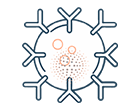Chronic Granulomatous Disease Precision Panel
Chronic Granulomatous Disease (CGD) is a genetically heterogeneous condition featuring recurrent, life-threatening bacterial and fungal infections as well as granuloma formation. CGD is caused by defects in the oxidative mechanisms found in phagocytes that are responsible for the destruction of certain microbes.




